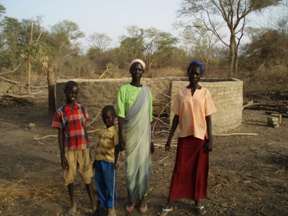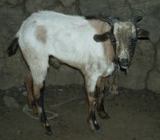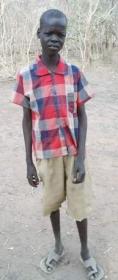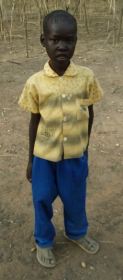In South Sudan there are stories of people and families that show the desperation and hardships of life. The story of Mel Magol’s family is one of these.
I had been conducting registrations for students at Wäramoth Primary School for approximately a week when one late afternoon, while I was sitting outside my tent, a lady and her two young sons came to see us. All three family members looked emaciated, as if they had just been released from a Nazi concentration camp. I was shocked, while everyone in South Sudan is thin, this family was starved.
The mother, whose name is Aliok, told me that she had walked for over two hours with her two sons because she wanted to register them for the school. I asked why she did not want them to attend a school closer to their home. She then explained that their home is actually in Wäramoth and they intend to return to live in Wäramoth, but they have not been able to re-construct their home there since returning to South Sudan in 2007. We started talking, with the help of Kuol’s translation, and this is her story.
Aliok fled to Khartoum, in the north of Sudan, with her mother, father and siblings during the 20 year long civil war. While she was there, she met and married her husband, Mel Magol. Mel had been a soldier fighting for the Sudan Peoples Liberation Army (SPLA), the rebel faction fighting for the people of South Sudan. After several years of fighting, Mel had decided to go and live in Khartoum where he met Aliok. Over the next 16 years they had four children, two girls and two boys.
In 2007, Mel decided to take his family home to their village in Wäramoth , South Sudan, as there was now peace. They returned in February 2007, a very difficult time of the year for the agarian people of Wäramoth . Most of their food supplies have finished, and they are desperately waiting for the rains to begin in June. Mel and his family had nothing to bring with them from Khartoum to re-start their lives in South Sudan, so they started with nothing.
Mel worked tirelessly for the next few months clearing land that had over-grown during the war for his family to sew their crops of sorghum when the rains came and starting to rebuild their house. He built a strong base for one house out of bricks that he made himself. While he was working, the family was getting thinner and thinner as there was nothing to eat. The children were getting sick. Mel eventually decided in about May that he would have to return to Khartoum to try and find work so that he could send money for his wife and children to buy food. He started the long journey back to Khartoum, but along the way, his emaciated body was overcome with sickness and he died.
This left Aliok to look after their four children alone. In Dinka culture, the brother of the husband must take care of the wife, so Aliok moved to live with Mel’s younger brother. However, Mel’s younger brother had his own family and had only recently returned to live in the South himself. There was a permanant shortage of food for everyone in the two families.
When we met Aliok and her children in February 2008, they had been suffering terribly for a year. While Aliok wanted to return to the house that her husband had started building in Wäramoth, she didn’t have any men that could complete the building of the house and finish clearing her land so that crops could be sewn.
Timpir gave Aliok and her family a
female goat through the Christmas gift program, to begin their herd. Additionally we gave them a male goat which Aliok will kill and cook as ‘payment’ for local men to come and finish building her house and clearing her land in time for cultivation in June. They will need all the help that Timpir can give them for many years to come.




